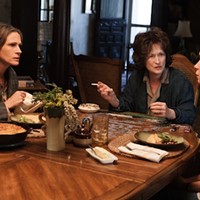(View From The Couch is a weekly column that reviews what's new on Blu-ray and DVD.)
THE COLOR OF MONEY (1986) / COCKTAIL (1988) / RANSOM (1998). Six degrees of new Disney Blu-ray releases: Cocktail lead Tom Cruise also stars in The Color of Money, which was written by Richard Price, who also co-scripted the Mel Gibson vehicle Ransom. Keep that in mind, kids, as a game option for a Cruise-Gibson connection.

-
Tom Cruise and Paul Newman in The Color of Money (Photo: Disney)
It's hard to find any true cineaste who doesn't feel Paul Newman was royally cheated when his career-defining performance in 1961's The Hustler lost out to Judgment at Nuremberg's Maximilian Schell for the Best Actor Oscar. Newman would finally win his Academy Award a quarter-century later, and it would be for The Color of Money, the Hustler sequel that found him reprising his role as pool shark Fast Eddie Felson. But don't believe those detractors who state this was merely a sympathy prize: Newman's terrific here, as his older and (usually) wiser character serves as mentor to a young stud (Cruise) who's seemingly invincible at the table. Working with his crack technical team, Martin Scorsese turns the film into a high-wire act, using everything from the crack of the balls to the rockin' soundtrack (best bit: Cruise playing and preening to Warren Zevon's "Werewolves of London") to pump up the action. In addition to Newman's win, this received nominations for Best Supporting Actress (Mary Elizabeth Mastrantonio as Cruise's street-smart girlfriend), Best Adapted Screenplay for Price, and Best Art Direction & Set Decoration.
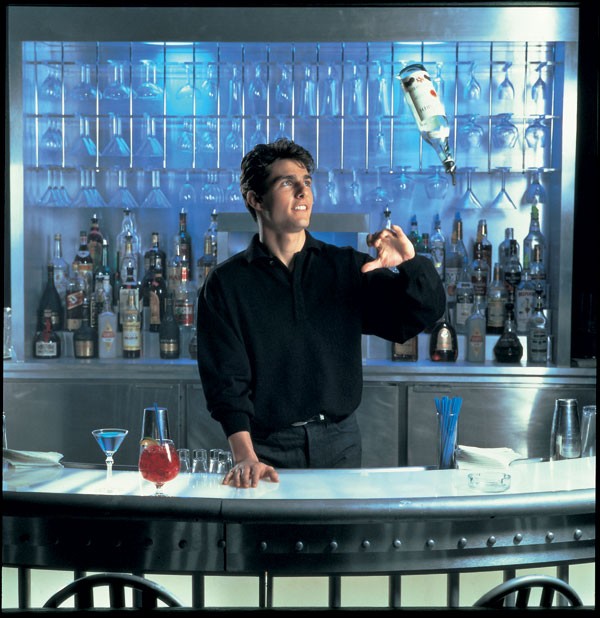
-
Tom Cruise in Cocktail (Photo: Disney)
During his meteoric career ascendancy, Cruise wisely paired himself with established legends by teaming with Newman in The Color of Money and Dustin Hoffman in Rain Man. In between, though, he made Cocktail, a bubblegum movie that was strictly eye candy for those fans still swooning over Top Gun. A Razzie Award winner for Worst Picture (over Burt Reynolds' non-nominated Rent-a-Cop? Please.) and Worst Screenplay (more deserving), this unintentional howler stars Cruise as Brian Flanagan, an ambitious young man who becomes nothing less than the hottest bartender in all of New York — maybe the world! His lecherous mentor is Doug Coughlin, whose daft advice Brian repeatedly takes to heart; after Doug betrays him, Brian moves to Jamaica (cue the movie's smash single, the Beach Boys' "Kokomo") and meets a beautiful and sincere woman (Elisabeth Shue) who might be right for him if he doesn't screw things up. The dialogue is priceless (or Price-less, since this is the only one of these three films Richard Price didn't script), filled with such gems as Doug telling Brian, "When you see the color of [the women's] panties, you know you've got talent. Stick with me, son; I'll make you a star."
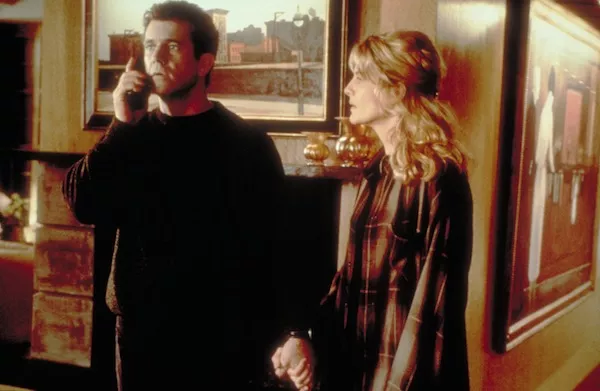
-
Mel Gibson and Rene Russo in Ransom (Photo: Disney)
I came to the Mel Gibson party late, finding most of his work in the 1980s and early 90s alternating between earnestly dull (Tequila Sunrise, The Man without a Face) or shamelessly hammy (Bird on a Wire, the original Lethal Weapon). But he found his stride as the 1990s moved forward, and he delivered arguably his career-best performance in Ransom, director Ron Howard's remake of a 1956 thriller starring Glenn Ford and Donna Reed. Gibson plays self-made millionaire Tom Mullen, a family man whose whole world crumbles when his son (Brawley Nolte, Nick's kid) is kidnapped by a gang demanding two million dollars for the boy's safe return. Tom initially complies, but as he comes to believe his son will be killed no matter what, he begins to behave unpredictably, reacting in a way that unnerves his wife (Rene Russo), the veteran FBI agent (Delroy Lindo) assigned to the case, and even the kidnappers themselves. The script is shaky — a needless subplot involving Tom's potentially shady business dealings merely fades away, and the climax is ludicrous — but Gibson's forceful performance allows Ransom to pay off with modest dividends.
There are no Blu-ray extras on The Color of Money or Cocktail. Blu-ray extras on Ransom include audio commentary by Howard; deleted scenes; and a behind-the-scenes special.
The Color of Money: ***1/2
Cocktail: *1/2
Ransom: **1/2
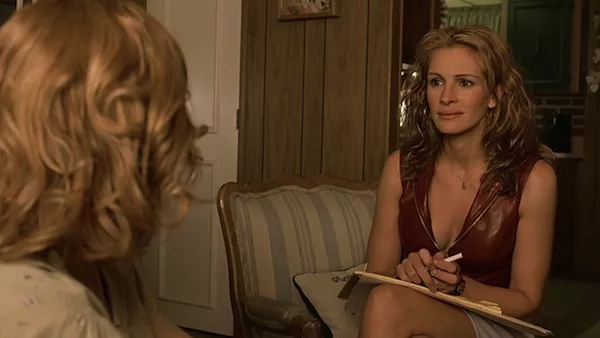
-
Julia Roberts in Erin Brockovich (Photo: Universal)
ERIN BROCKOVICH (2000). By Y2K, Julia Roberts was used to appearing in blockbusters — 1999 alone had produced two $100 million grossers in Notting Hill and Runaway Bride — but 2000 saw her headlining a commercial and critical smash, one that finally earned her a Best Actress Oscar. She's sensational as the title character, an ill-educated, twice-divorced mother of three who bullies a rumpled attorney (Albert Finney, wonderful) into giving her a job. Working diligently, she eventually stumbles across a cover-up involving a local power plant, contaminated water and lots of ailing residents. There's really no reason this kind of conventional David-and-Goliath tale (based on a true story) should make for such a compelling motion picture, but director Steven Soderbergh and scripter Susannah Grant smartly mix plenty of humor and unflagging inspiration into the drama. In addition to Roberts' victory, this scored four additional Oscar nominations for Best Picture, Best Director (Soderbergh won for his other 2000 triumph, Traffic), Best Supporting Actor (Finney) and Best Original Screenplay.
Blu-ray extras include a half-hour of deleted scenes that help deepen the relationships between characters and fill in some plot jumps (that cold that Erin catches and loses in the blink of an eye in the theatrical version runs its full course here); a making-of featurette; and an interview with the real Erin Brockovich (who briefly appears in the movie as a waitress).
Movie: ***1/2
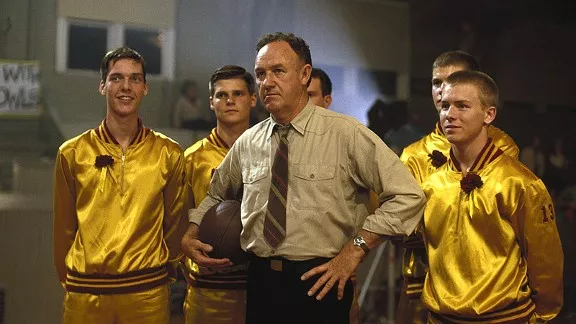
-
Gene Hackman (center) in Hoosiers (Photo: Fox/MGM)
HOOSIERS (1986). Long considered one of the best sports movies ever made by those in the know (i.e. wags at Sports Illustrated and ESPN as well as basketball fans across the country), Hoosiers works the underdog formula so expertly that it's no surprise the film still has the ability to uplift audiences over a quarter of a century later. Much of its appeal comes courtesy of Gene Hackman, whose work here — a canny mix of aw-shucks bluster and below-the-surface slyness — was a warm-up for the career-best performance he would deliver two years later in Mississippi Burning. Hackman stars as Norman Dale, a basketball coach who arrives in the small town of Hickory, Indiana, in 1951 to take the reins on a high school basketball team (the Hickory Huskers) whose beloved coach has just passed away between seasons. Still nursing emotional wounds from a secretive past, Dale finds himself facing townspeople who don't approve of his coaching methods, though he does acquire some allies in a plainspoken teacher (Barbara Hershey), the town's hoops-savvy drunk (Dennis Hooper) and, eventually, the players themselves. Both Hopper and composer Jerry Goldsmith earned Oscar nominations for their worthy contributions (although Hopper actually earned more honors elsewhere for his demented turn in the same year's Blue Velvet).
Blu-ray extras include audio commentary by director David Anspaugh and writer Angelo Pizzo; 30 minutes of deleted scenes that answer several lingering questions from the theatrical cut (such as why the team roster suddenly jumps from seven to eight players at one point in the movie); a look at the real-life team (the Milan Indians) that inspired the film; and — get this — the original 1954 championship game.
Movie: ***
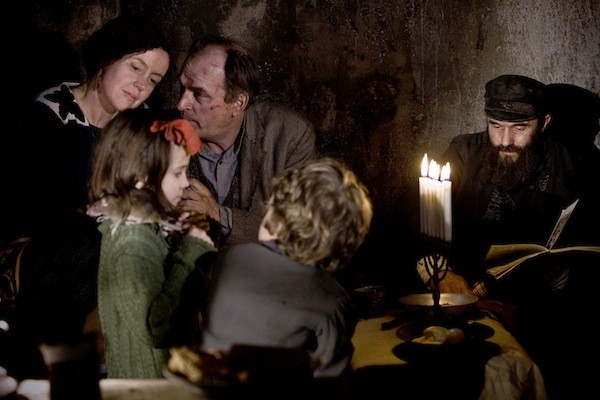
-
In Darkness (Photo: Sony)
IN DARKNESS (2011). Director Agnieszka Holland's Europa Europa, which was all the art-house rage back in the early 1990s, related the true story of a Jewish boy who, during World War II, concealed his identity by pretending to be German and joining the Hitler Youth. For her latest film, Holland again turns to a fascinating footnote from that chapter in history. An Oscar nominee for Best Foreign Language Film, In Darkness centers on Leopold Socha (Robert Wieckiewicz), a Polish laborer who happens upon a group of Jews hiding from the Nazis in the city's sewers. Socha is hardly cut from the same cloth as Oskar Schindler: He initially decides that he can only protect a handful of them rather than the whole lot, and once he has his chosen few, he takes their valuables in exchange for finding them safe corners in the sewer system and bringing them the occasional food. It's hardly a spoiler to reveal that Socha begins to feel compassion for these unfortunates, but move beyond this expected development and what's interesting to note are the character dynamics at work. At least one Jew, a sturdy fellow named Mundek (Benno Furmann), is certain that Socha will eventually betray them, while others are more hopeful he'll continue to do the right thing. Socha's wife Wanda (Kinga Preis, who based on her award wins must be the Meryl Streep of Poland) is sympathetic toward the Jewish race but becomes angry when she learns of her husband's risky, personal involvement. And there are several skirmishes among the Jews themselves, with the boredom of 24/7 sewer living understandably taking its toll. Holland and scripter David F. Shamoon (adapting Robert Marshall's book) drag all these various story strands into the light, yet the most striking historical nugget isn't dramatized; instead, it pops up in the closing credit scrawl, a swift blow reminding us that Fate has one helluva wicked sense of irony.
Blu-ray extras include a Q&A session with Holland; a conversation between Holland and real-life Holocaust survivor Krystyna Chiger; and the theatrical trailer.
Movie: ***

-
Jude Law and Robert Downey Jr. in Sherlock Holmes: A Game of Shadows (Photo: Warner)
SHERLOCK HOLMES: A GAME OF SHADOWS (2012). If I wanted to see a movie featuring Indiana Jones, I would watch Raiders of the Lost Ark. If I wanted to see a movie featuring James Bond, I would watch Goldfinger. If I wanted to see a movie featuring Sherlock Holmes, I would watch — well, certainly not Sherlock Holmes: A Game of Shadows, which might as well be a period Expendables prequel for all the reverence given to the legendary sleuth. Sir Arthur Conan Doyle's Baker Street brainiac remains one of literature's greatest detectives, but because actions always count more than words in today's Hollywood, 2009's Sherlock Holmes reinvented the character as a kick-ass macho man, more Rambo than Miss Marple. Nevertheless, the freshness of Robert Downey Jr.'s exuberant portrayal as Holmes and the measured counterpoint provided by Jude Law as Dr. Watson managed to overpower Guy Ritchie's hyperkinetic direction. Not this time. Ritchie's show-off stylistics are often embarrassing to behold — this is particularly true in the action sequences, of which there are countless. As he battles his deadly nemesis Professor Moriarty (Jared Harris) and his minions, Holmes most often applies his formidable smarts not to uncovering clues but to enhancing his advantage in hand-to-hand skirmishes. Is this Sherlock Holmes or Muhammad Ali? Some silly asides, such as Holmes' camouflage coat, are best forgotten, but the steady bickering between Holmes and Watson has yet to reach the straining point (thank the ingratiating actors for that). Noomi Rapace, currently in Prometheus, turns up here as a gypsy fortune teller, although it's easy to miss her amidst the dizzying swirl of furious fisticuffs, blazing gunfights, and home-theater-rocking explosions. Have at it — me, I'll be watching my Columbo box sets.
The combo pack includes the Blu-ray, the DVD, and UltraViolet download. The Blu-ray presents its extras in the form of Maximum Movie Mode, a picture-in-picture feature in which Downey takes viewers through the film, accompanied by interviews, featurettes and storyboards.
Movie: **
SPIDER-MAN (2002) / SPIDER-MAN 2 (2004) / SPIDER-MAN 3 (2007). With the reboot about to swing into theaters July 3, Sony Home Entertainment has elected to re-release the blockbuster trilogy on Blu-ray. Even better, they remembered to include the extras this time.
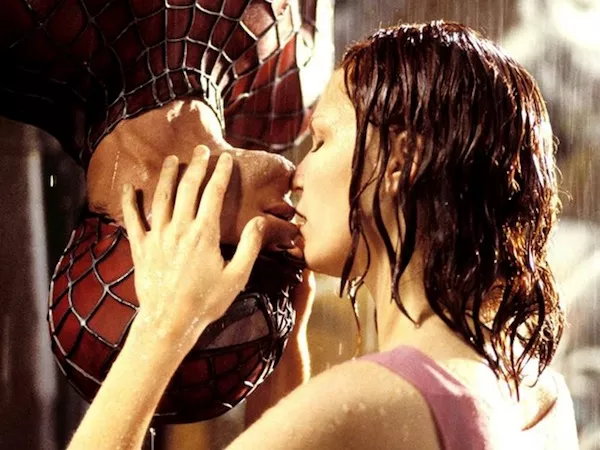
-
Tobey Maguire and Kirsten Dunst in Spider-Man (Photo: Sony)
It was a given that the long-awaited Spider-Man movie, released in 2002 after a 39-year gestation period on the comic book page, would make millions, even if its hero had been played by John Travolta sporting his Battlefield Earth dreadlocks. But while director Sam Raimi's surefooted adaptation doesn't quite reach the upper echelon of superhero flicks, it mostly gets everything right. Tobey Maguire was a great choice to play Peter Parker, the nerdy teenager who turns into a wall-crawling, web-swinging superhero after being bitten by a unique arachnid, and his casting is matched by J.K. Simmons as roaring newspaper editor J. Jonah Jameson. The other performers (including Kirsten Dunst as Mary Jane Watson, James Franco as Harry Osborn and Willem Dafoe as Norman Osborn/Green Goblin) are also aptly chosen, and the picture largely works because Raimi and scripter David Koepp manage to turn it into a successful tightrope act between soap opera and spectacle, retaining the personal elements that made the comic book so popular while providing the requisite big-bang special effects that thankfully never overwhelm the story.

-
Tobey Maguire in Spider-Man 2 (Photo: Sony)
Spider-Man 2 is even more ambitious than its predecessor, and some ill-advised decisions don't overshadow the overall sense that we're watching a film franchise grow up right before our eyes. In this outing, Peter experiences a crisis of conscience: How can he lead a normal, happy life when his role as the masked crimefighter seems to ruin everything? He contemplates giving up his swinging lifestyle to make time for Mary Jane, but the presence of a new villain in town — the multi-tentacled Doctor Octopus (Alfred Molina) — alters his plans. Our hero's exaggerated powers often make him seem more like Superman than Spider-Man, but the Oscar-winning visual effects pack a punch, and the human element that defines the comic series again lives through Maguire's appealing performance.
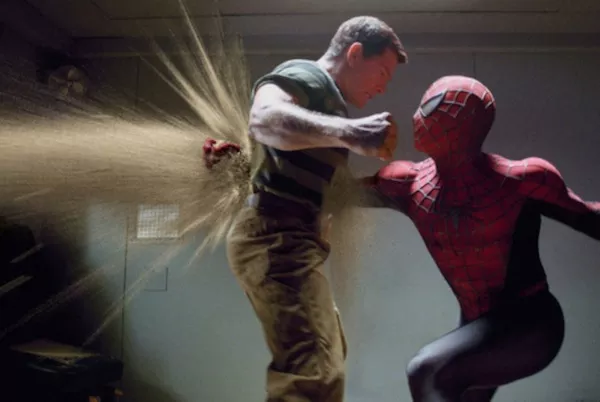
-
Thomas Haden Church and Tobey Maguire in Spider-Man 3 (Photo: Sony)
As was the case with the third X-Men film (2006's X-Men: The Last Stand), Spider-Man 3 is regarded by just about everyone as the distant third-place finisher in this franchise. The film doesn't lead me to bouts of depression and thoughts of suicide as it apparently does other fans, but it's clearly no match for the first two titles. With a script by Raimi, his brother Ivan, and Oscar winner Alvin Sargent (Ordinary People), this third installment is packed to the rafters with activity and excitement. On the domestic front, Peter and Mary Jane find themselves struggling with relationship woes, while on the battlefields of NYC, Spider-Man must face off against the Sandman (Thomas Haden Church), Venom (Topher Grace), a new Green Goblin (Franco ), and his own dark impulses. The move is too overcrowded for its own good, with the Venom and "dark Spidey" plotlines especially taking a narrative beating. But Church delivers a fine performance as a conflicted villain, and the effects employed to turn him into the Sandman are phenomenal.
The Spider-Man Blu-ray set from 2007 infuriated fans by not including any extra features for films 1 and 2. This re-release rectifies that problem, as the majority of the bonus features originally found on the DVDs have finally been carried over. Among the countless extras are cast and filmmaker commentaries; behind-the-scenes featurettes; screen tests; music videos; blooper reels; and more. New to the Spider-Man Blu-ray are the interactive "Spider Sense Trivia Challenge" and "The Spider-Man Cutting Room." Finally, each title (all sold separately) includes a free movie ticket offer for The Amazing Spider-Man.
Spider-Man: ***
Spider-Man 2: ***
Spider-Man 3: **1/2
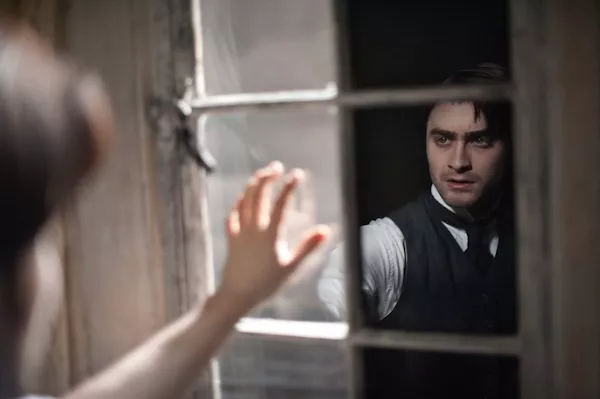
-
Daniel Radcliffe in The Woman in Black (Photo: Sony)
THE WOMAN IN BLACK (2012). Before it largely imploded in the mid-1970s, Britain's Hammer Film Productions spent two decades producing lush, atmospheric horror flicks, in the process re-igniting filmgoer passion for classic monster movies and making genre superstars out of Christopher Lee and Peter Cushing. Two years ago, the outfit returned to screens with the critically acclaimed, audience-ignored Let Me In; here, they offer The Woman in Black, a chance for Daniel Radcliffe to experience life post-Harry Potter. For the record, Radcliffe is fine; the film, on the other hand, is tepid enough to leave Dracula — the one who looks like Christopher Lee, of course — spinning in his grave. Based on Susan Hill's novel, this finds Radcliffe cast as Arthur Kipps, a widowed lawyer assigned to visit a remote village in order to settle the estate of a recently deceased elderly woman. In the film's best nod to vintage horror, the country rubes all view the newcomer with suspicion and do little to aid him in his task. The reason, it turns out, is that they believe the stomping grounds of the departed are haunted by the title apparition, an evil entity with a sweet tooth for tragedy and children. Both fascinated by the legend and fearful that it might has some basis in reality, Arthur opts to spend the night at the creepy mansion — and it's here where the film primarily jumps the tracks. The best ghost stories are the ones that rely on careful exposition and a pervasive sense of mounting dread to unsettle audiences (The Others and The Orphanage being modern examples), but director James Watkins and scripter Jane Goldman abandon that approach shockingly fast. Instead, this is the sort of spook show that tries to manufacture scares by having something rapidly leap into the frame, startling both the protagonist and many viewers. Usually, it's a cat; here, it's everything but. Yet this sort of cheap thrill becomes predictable before long (to quote an eloquent ex-president, "Fool me once, shame on — shame on you. Fool me — you can't get fooled again."), resulting in a supernatural saga with little shelf life. It's certainly nice to have Hammer back in business, but let's hope they nail down more promising projects than this one.
DVD extras include audio commentary by Watkins and Goldman; a making-of featurette; and a piece on Radcliffe's work in the film.
Movie: **


